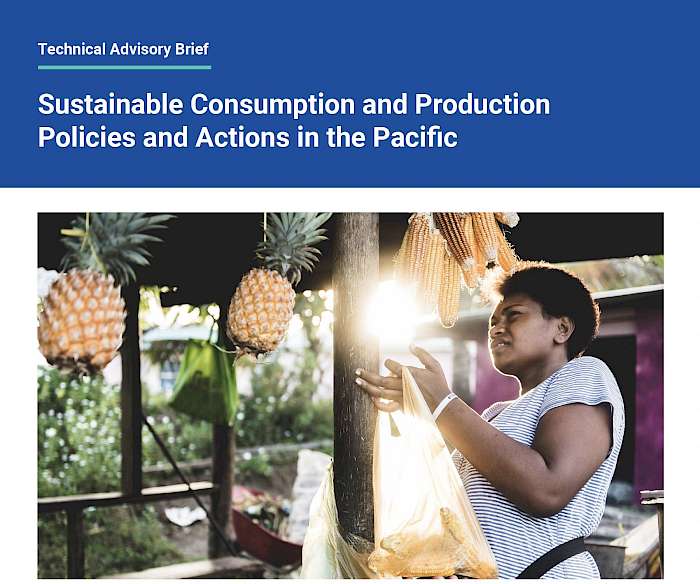
The Multi-Stakeholder Consultation (MSC) on Mainstreaming Sustainable Consumption and Production (SCP) Policies and Actions in the Pacific was held on 11th October 2023 as a back-to-back event of the EU SWITCH-Asia Annual Conference held in Jakarta, Indonesia.
Led by the SWITCH-Asia Policy Support Component (PSC), it brought together the EU Delegations in the Pacific, representatives from Pacific countries such as Papua New Guinea, Nauru, Kiribati, and Fiji, and regional and international organisations and stakeholders actively supporting the region, such as the South Pacific Regional Environment Programme (SPREP) and UN agencies such as United Nations Centre for Regional Development (UNCRD), UN Economic and Social Commission for Asia and the Pacific (UN ESCAP Pacific), International Fund for Agricultural Development (IFAD), Food and Agriculture Organisation (FAO), among others.
In the consultation, Mr. Guy Janaway, Programme Coordinator for the SWITCH-Asia Programme of the European Commission highlighted how committed the EU is in supporting the Pacific countries to transition to SCP and Circular Economy (CE) through the Programme, which has expanded its scope of work to the Middle East and the Pacific. Ms. Elodie Marie-Sube, key expert from the SWITCH-Asia PSC, presented the policies of the European Union on SCP and Circular Economy through EU Green Deal and Global Gateway and its EU Strategy for Cooperation in the Pacific. Dr. Zinaida Fadeeva, Team Leader of SWITCH-Asia PSC presented the two components of the Programme, the grants scheme where stakeholders with EU partnerships are provided support to advance SCP in the region and the PSC providing adaptable and demand-driven interventions, coupled with its mandate to encourage cooperation, enhance networking, and create a platform for knowledge exchange in the Asia Pacific region.

The Technical Advisory on SCP Policies and Actions in the Pacific implemented by the SWITCH-Asia PSC will develop an engagement strategy in consultation with stakeholders in the region based on a shared understanding of SCP that considers the local context and diversity of the Pacific States and their needs. The implementation of the programme will seek for synergies among Pacific countries and with other ongoing initiatives in the region. The experts of other SWITCH-Asia Technical Advisory Projects and Grant Projects currently being implemented also presented their work focused on Green Public Procurement, Climate Change, and Sustainable Building and Construction to provide guidance on possible support of SWITCH-Asia to the Pacific.
Ms. Loraine Gatlabayan, SCP Expert from SWITCH-Asia PSC presented on the importance of SCP to address the triple planetary crises (climate change, biodiversity loss and pollution) and meet international commitments such as the Sustainable Development Goals (SDGs) and the Paris Agreement. She also presented the results of the regional session for the Pacific of the SWITCH-Asia Annual Conference held the day before, highlighting discussions on the importance of preserving and promoting sustainable traditional practices and lifestyle of Pacific people and the SCP priorities and needs discussed, which are reflected in the sectoral issues concerning resource use and pollution focused on waste and plastic, agrifood and fisheries, and tourism, building and construction among others.
Mr. Arab Hoballah, Senior Expert of the SWITCH-Asia PSC presented an overview of the scoping and engagement strategy, which centres on the SCP Talanoa Dialogues and Entrepreneurship Catalyst to identify the SCP status, needs and actions with prospective partners in the region.
He emphasized that SCP needs and priorities must be tailored based on the region’s unique geographic position and economic development which hinges on their natural resources and ecosystems. There is a need to find ways to balance economic growth and resource use while minimizing harm to the environment which promotes people’s well-being. Developing strategies for SCP requires addressing issues of resource management, waste minimisation, and community engagement.
There was consensus in terms of the countries need for support on SDG 12 implementation and reporting focusing on waste and plastic reduction, support to businesses and SMEs and contributing to SCP related goals through SME support in the priority sectors such as agrifood, tourism, housing, and buildings. There was also discussion on the need to provide policy support on SCP policies and actions, to foster innovation by MSMEs and local communities, and provide access to finance and technology towards replication, acceleration and scaling up, and to build capacity of SMEs to shift to producing sustainable products and services, looking at possible circular products from waste.
The Pacific could benefit from the sharing of learnings on the SCP policies and good practices in the other regions through SWITCH-Asia. Through its engagement strategy, SWITCH-Asia hopes to complement the initiatives being undertaken by active partners in the region towards sustainability and prosperity in the region, through collective actions for impactful transformative change. Bilateral and multilateral consultations with Pacific countries and organizations, including focused online webinars and where possible in person events, will be undertaken in the next few months as part of developing this strategy.
Zoom recording available here
Passcode: Vp#!7R35



